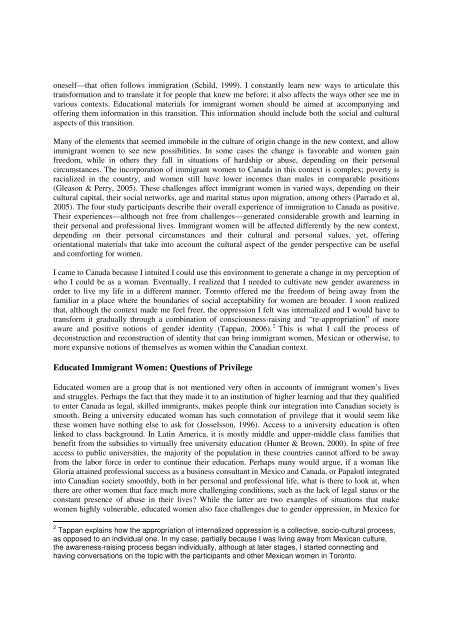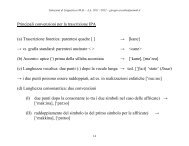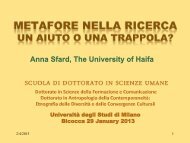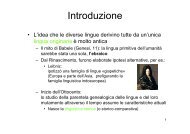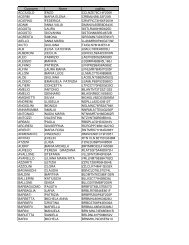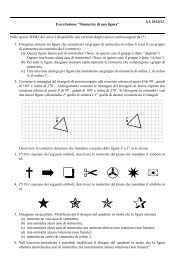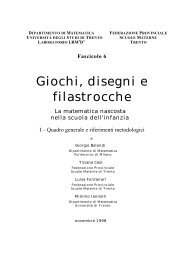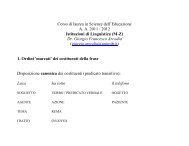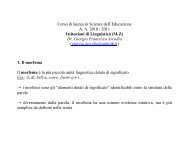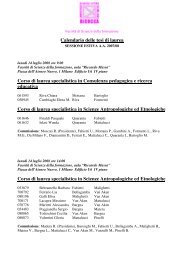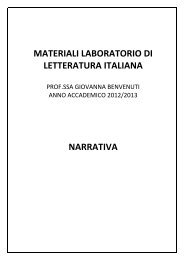Life history research: A contribution to processes of adult learning ...
Life history research: A contribution to processes of adult learning ...
Life history research: A contribution to processes of adult learning ...
You also want an ePaper? Increase the reach of your titles
YUMPU automatically turns print PDFs into web optimized ePapers that Google loves.
oneself—that <strong>of</strong>ten follows immigration (Schild, 1999). I constantly learn new ways <strong>to</strong> articulate this<br />
transformation and <strong>to</strong> translate it for people that knew me before; it also affects the ways other see me in<br />
various contexts. Educational materials for immigrant women should be aimed at accompanying and<br />
<strong>of</strong>fering them information in this transition. This information should include both the social and cultural<br />
aspects <strong>of</strong> this transition.<br />
Many <strong>of</strong> the elements that seemed immobile in the culture <strong>of</strong> origin change in the new context, and allow<br />
immigrant women <strong>to</strong> see new possibilities. In some cases the change is favorable and women gain<br />
freedom, while in others they fall in situations <strong>of</strong> hardship or abuse, depending on their personal<br />
circumstances. The incorporation <strong>of</strong> immigrant women <strong>to</strong> Canada in this context is complex; poverty is<br />
racialized in the country, and women still have lower incomes than males in comparable positions<br />
(Gleason & Perry, 2005). These challenges affect immigrant women in varied ways, depending on their<br />
cultural capital, their social networks, age and marital status upon migration, among others (Parrado et al,<br />
2005). The four study participants describe their overall experience <strong>of</strong> immigration <strong>to</strong> Canada as positive.<br />
Their experiences—although not free from challenges—generated considerable growth and <strong>learning</strong> in<br />
their personal and pr<strong>of</strong>essional lives. Immigrant women will be affected differently by the new context,<br />
depending on their personal circumstances and their cultural and personal values, yet, <strong>of</strong>fering<br />
orientational materials that take in<strong>to</strong> account the cultural aspect <strong>of</strong> the gender perspective can be useful<br />
and comforting for women.<br />
I came <strong>to</strong> Canada because I intuited I could use this environment <strong>to</strong> generate a change in my perception <strong>of</strong><br />
who I could be as a woman. Eventually, I realized that I needed <strong>to</strong> cultivate new gender awareness in<br />
order <strong>to</strong> live my life in a different manner. Toron<strong>to</strong> <strong>of</strong>fered me the freedom <strong>of</strong> being away from the<br />
familiar in a place where the boundaries <strong>of</strong> social acceptability for women are broader. I soon realized<br />
that, although the context made me feel freer, the oppression I felt was internalized and I would have <strong>to</strong><br />
transform it gradually through a combination <strong>of</strong> consciousness-raising and “re-appropriation” <strong>of</strong> more<br />
aware and positive notions <strong>of</strong> gender identity (Tappan, 2006). 2 This is what I call the process <strong>of</strong><br />
deconstruction and reconstruction <strong>of</strong> identity that can bring immigrant women, Mexican or otherwise, <strong>to</strong><br />
more expansive notions <strong>of</strong> themselves as women within the Canadian context.<br />
Educated Immigrant Women: Questions <strong>of</strong> Privilege<br />
Educated women are a group that is not mentioned very <strong>of</strong>ten in accounts <strong>of</strong> immigrant women’s lives<br />
and struggles. Perhaps the fact that they made it <strong>to</strong> an institution <strong>of</strong> higher <strong>learning</strong> and that they qualified<br />
<strong>to</strong> enter Canada as legal, skilled immigrants, makes people think our integration in<strong>to</strong> Canadian society is<br />
smooth. Being a university educated woman has such connotation <strong>of</strong> privilege that it would seem like<br />
these women have nothing else <strong>to</strong> ask for (Josselsson, 1996). Access <strong>to</strong> a university education is <strong>of</strong>ten<br />
linked <strong>to</strong> class background. In Latin America, it is mostly middle and upper-middle class families that<br />
benefit from the subsidies <strong>to</strong> virtually free university education (Hunter & Brown, 2000). In spite <strong>of</strong> free<br />
access <strong>to</strong> public universities, the majority <strong>of</strong> the population in these countries cannot afford <strong>to</strong> be away<br />
from the labor force in order <strong>to</strong> continue their education. Perhaps many would argue, if a woman like<br />
Gloria attained pr<strong>of</strong>essional success as a business consultant in Mexico and Canada, or Papalotl integrated<br />
in<strong>to</strong> Canadian society smoothly, both in her personal and pr<strong>of</strong>essional life, what is there <strong>to</strong> look at, when<br />
there are other women that face much more challenging conditions, such as the lack <strong>of</strong> legal status or the<br />
constant presence <strong>of</strong> abuse in their lives? While the latter are two examples <strong>of</strong> situations that make<br />
women highly vulnerable, educated women also face challenges due <strong>to</strong> gender oppression, in Mexico for<br />
2 Tappan explains how the appropriation <strong>of</strong> internalized oppression is a collective, socio-cultural process,<br />
as opposed <strong>to</strong> an individual one. In my case, partially because I was living away from Mexican culture,<br />
the awareness-raising process began individually, although at later stages, I started connecting and<br />
having conversations on the <strong>to</strong>pic with the participants and other Mexican women in Toron<strong>to</strong>.


